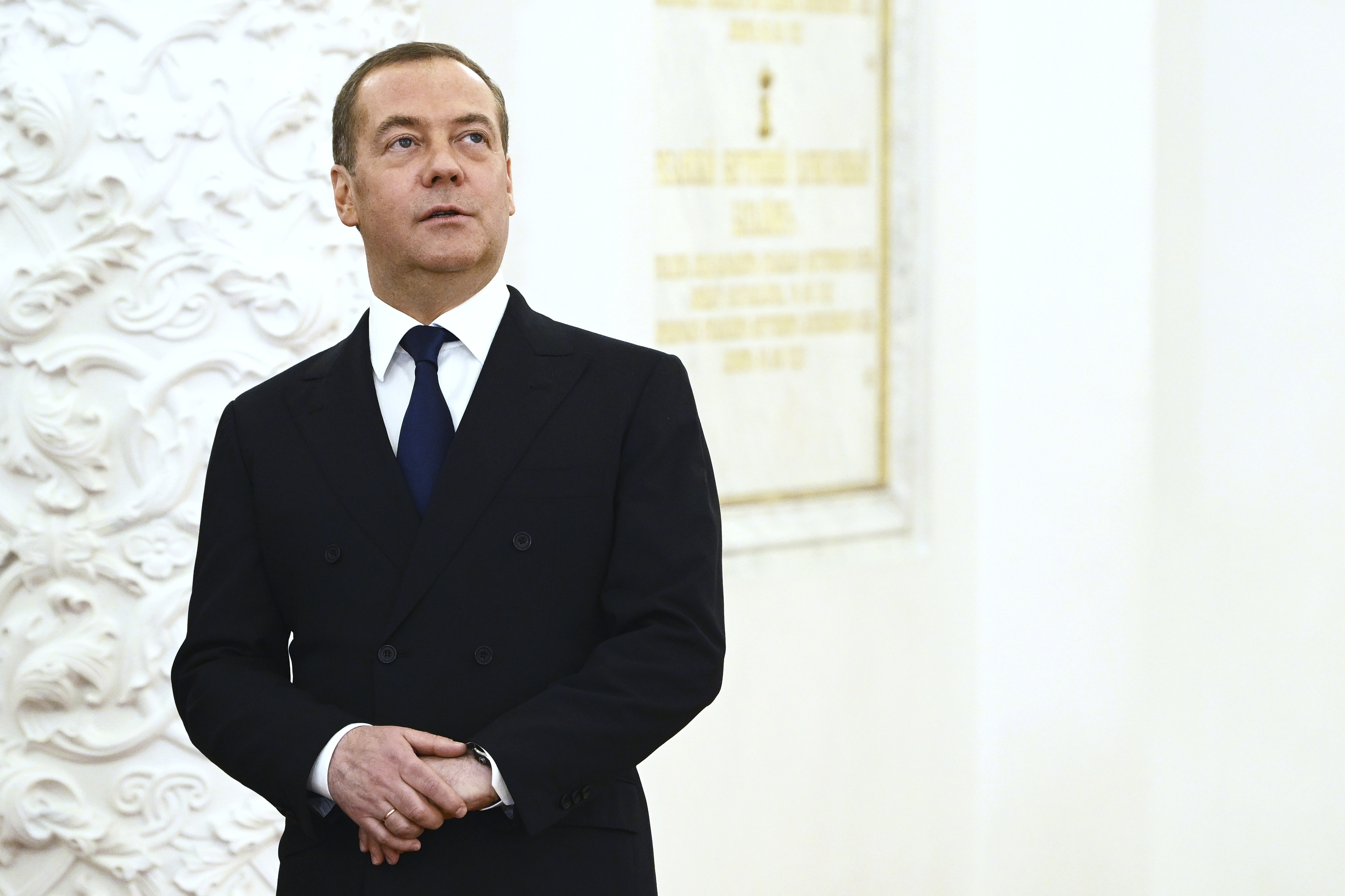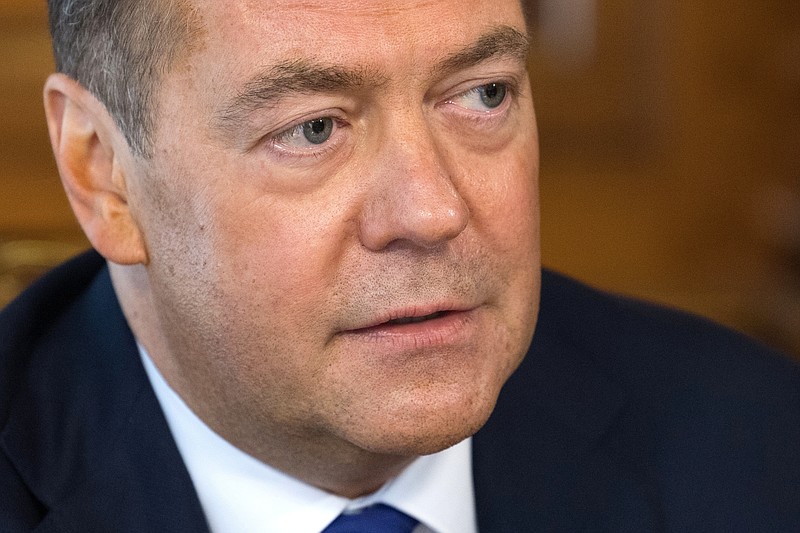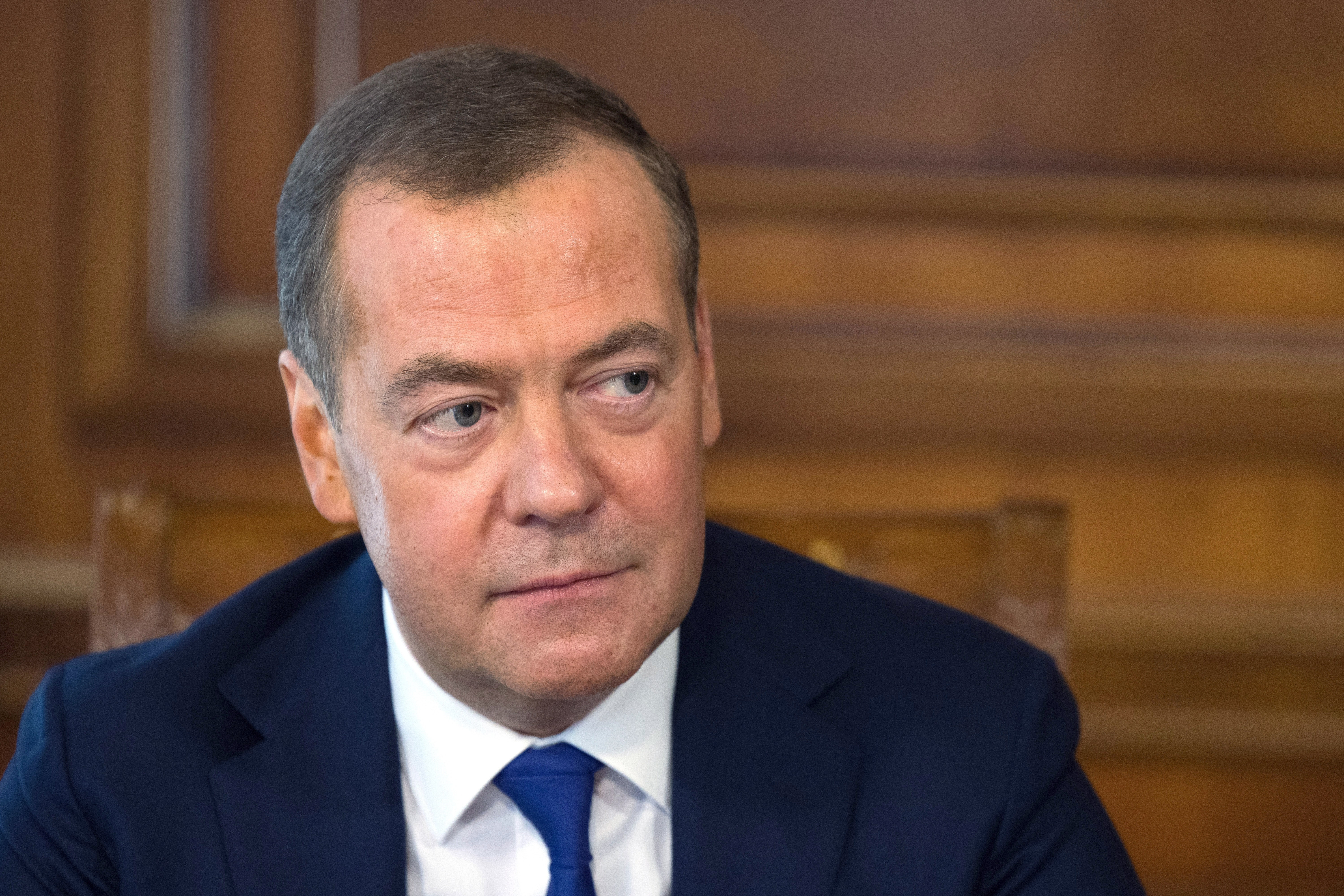MOSCOW -- A top Russian security official warned Thursday about the rising threat of a nuclear war and blasted a German minister for threatening Russian President Vladimir Putin with arrest, saying that such action would amount to a declaration of war and trigger a Russian strike on Germany.
Dmitry Medvedev, the deputy secretary of Russia's Security Council chaired by Putin, said in video remarks to reporters that Russia's relations with the West have hit an all-time bottom.
Asked whether the threat of a nuclear conflict has eased, Medvedev responded: "No, it hasn't decreased, it has grown. Every day when they provide Ukraine with foreign weapons brings the nuclear apocalypse closer."
He has issued a barrage of such strongly worded statements in the past, blasting the U.S. and its NATO allies for what he described as their efforts to break up and destroy Russia. It's been a drastic metamorphosis for the gentle-looking politician, who once was hailed by the West as a liberal hope.
In Thursday's comments, the 57-year-old Medvedev denounced the International Criminal Court's decision to issue an arrest warrant for Putin on charges of alleged involvement in abductions of thousands of children from Ukraine as legally null and void. He noted that the move added to a "colossal negative potential" in the already bitterly strained ties between Russia and the West.
"Our relations with the West are already worse than they have ever been in history," he said.
Medvedev specifically blasted German Justice Minister Marco Buschmann, who said last week that Putin would be arrested on the ICC's warrant if he visits Germany.
"Let's imagine ... the leader of a nuclear power visits the territory of Germany and is arrested," Medvedev said, adding that it would amount to a declaration of war against Russia. "In this case, our assets will fly to hit the Bundestag, the chancellor's office and so on."
He noted that Russia's nuclear forces have provided a strong deterrent amid the fighting in Ukraine, adding that "we would have been torn to pieces without them."
Medvedev also challenged Ukraine's sovereignty in comments that could reflect Moscow's plans to extend its gains.
"Honestly speaking, Ukraine is part of Russia," he said. "But due to geopolitical reasons and the course of history we had tolerated that we were living in separate quarters and had been forced to acknowledge those invented borders for a long time."
The soft-spoken and mild-mannered Medvedev, who served as Russia's president from 2008 to 2012 when term limits forced Putin to shift into the prime minister's post, was widely seen by Western officials as more liberal than his mentor. Many in the West expected Medvedev to win a second term and further soften the Kremlin's policies, but he stepped down to allow Putin to reclaim the presidency in what Kremlin critics denounced as a cynical manipulation.
Since Putin sent troops into Ukraine more than a year ago, Medvedev, a law faculty graduate, has emerged as one of the most hawkish Russian officials, regularly issuing blustery remarks that combine Latin mottos and legal expressions with four-letter words, and sound much tougher than those issued by old-time Kremlin hard-liners. Observers have interpreted Medvedev's rhetoric as an apparent attempt to curry favor with Putin.
HUNGARY AND THE ICC
Authorities in Hungary would not arrest Putin if he were to enter the country despite his being the subject of an international warrant for alleged war crimes in Ukraine, a Hungarian official said Thursday.
Gergely Gulyas, chief of staff to Hungarian Prime Minister Viktor Orban, said during a news conference in Budapest that arresting Putin would contravene Hungarian law because the country has not promulgated the statute of the International Criminal Court into its legal system.
Gulyas said the statute of the ICC, of which Hungary is a member state, was in conflict with Hungary's Constitution, and that arresting Putin would therefore violate Hungarian law. Orban's government has not yet taken a position on the warrant, but Gulyas said he considered it counterproductive.
"I think these decisions are not the most fortunate because they lead toward escalation and not toward peace," he said.
The chances of Putin facing trial in The Hague are highly unlikely because Moscow does not recognize the ICC's jurisdiction or extradite its nationals. However, the warrant could limit the Russian leader's ability to travel to the tribunal's 123 member nations, which could arrest him in accordance with the warrant.
Information for this article was contributed by Vladimir Isachenkov and staff writers of The Associated Press.
 Russian Security Council Deputy Chairman and the head of the United Russia party Dmitry Medvedev arrives to attend the talks with Russian President Vladimir Putin and Chinese President Xi Jinping at The Grand Kremlin Palace, in Moscow, Russia, Tuesday, March 21, 2023. (Alexey Maishev, Sputnik, Kremlin Pool Photo via AP)
Russian Security Council Deputy Chairman and the head of the United Russia party Dmitry Medvedev arrives to attend the talks with Russian President Vladimir Putin and Chinese President Xi Jinping at The Grand Kremlin Palace, in Moscow, Russia, Tuesday, March 21, 2023. (Alexey Maishev, Sputnik, Kremlin Pool Photo via AP)

